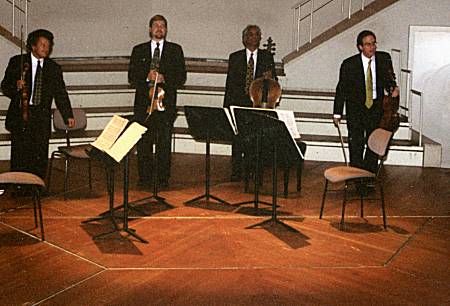|
BERLIN FESTIVAL DIARY

Five weeks condensed into three, with BILL NEWMAN

<< Continued from last week
Luigi Nono's works require far more concentrated effort from the listener;
a daring challenge for any Sunday afternoon audience more used to the local
band in the park! But this is the kind of fare that Berlin's music devotees
take in their stride with their almost fanatical desire for new experimental
sounds.
The Arditti Quartet have a recognized penchant for devoting their repertoire
to demanding 20th century compositions of acknowledged importance, and when
lst and 2nd violins took their position high up in the auditorium, opposite
each other, shifting stations as the composer demanded in Hay que caminar
Soñando, I had to imagine myself in an aircraft in the stratosphere
aware of high pitched harmonics in the ears, which floating downwards became
stilled in the imagination before changes in tonal perspective through loss
of altitude altered them into something completely different. There is a
connecting thread to the various strands of sound, but you have to 'discover'
it yourself. Fragmente -- Stille. An Diotima for string quartet widens
the sonic spectrum even further, and in my quest for enlightenment I asked
Irvine Arditti to talk with me later in more detail in London. 'We are hardly
ever there!', he replied, but offered me his artist contact for 2001.

By this time I realized that an embarrassment of musical riches was about
to take place through a series of carefully planned programmes featuring
top-notch performances by artists fully prepared to meet each and every
musical and technical challenge, rare and familiar alike. 20th century Czech
masters afforded perfect opportunities.
Martinu's Madrigale is well known on disc, but to hear three selections
-- for oboe, clarinet and bassoon; violin and viola; flute, violin and piano
at the start of Ensemble Aventure's vastly entertaining programme, is unusual.
This is far more than mere note spinning, as Martinu's critics unfairly
label some of his output, but full of harmonic inventions mounted on an
astute folkloristic setting. Alois Hába's many-toned idioms can cause
confusion to listeners, but the Pellegrini Quartet's choice of Quartet No
14, Op 94 measures the occasional quarter tone passage within a natural
harmonic setting without distractions. Imagine my surprise when they joined
up with Ensemble Aventure for the Nonet No 3, Op 82, a full scale tonal
work of 'orchestral' propensities -- strings, winds and brass (including
a gorgeous part for French horn) in the style of Richard Strauss through
to Hindemith.
Continue >>
Copyright © 12 December 2000
Bill Newman, Edgware, UK
 VISIT THE BERLIN FESTIVAL WEBSITE
<< Music
& Vision home
Polish State Opera >>
VISIT THE BERLIN FESTIVAL WEBSITE
<< Music
& Vision home
Polish State Opera >>
|

